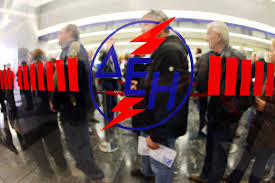Energy market officials fear Production Reconstruction, Environment and Energy Minister Panayiotis Lafazanis’s recent barrage of statements rejecting a plan by RAE, the Regulatory Authority for Energy, to increase an Emission Reduction Tariff (ETMEAR) surcharge included on electricity bills may prompt a new movement of disgruntled consumers who will refuse to pay their bills until the dispute has been settled.
The drastic effects of the country’s deep recession over the past six years or so has driven a large number of consumers to refuse paying electricity bills whenever dubious amounts have been loaded onto them, such as a property tax in the not too distant past.
In recent days, Lafazanis has warned that if RAE does not scrap its planned ETMEAR hike, then he will do so through a law amendement. The dispute has caused a rift between the two sides. The minister has also openly declared he intends to suppress RAE’s powers.
Although the ETMEAR increase would not be substantial – it is estimated at two euros per household for every four-month billing period – it could spark a disproportionate wider reaction among cash-strapped households.
PPC, the Public Power Corporation, has mailed out between 1.5 million and two million electricity bills since RAE’s ETMEAR hike was officially announced on March 4. These bills include the surcharge hike, applied retroactively for electricity consumed, beginning in January, as part of RAE’s wider effort to eliminate the renewable energy source (RES) special account deficit, which stands as a bailout agreement condition. The ministry has demanded that RAE find alternative measures of equal monetary worth that do not affect consumers.
To date, PPC has not taken a position on the dispute between the energy minister and RAE. The power utility’s officials have gone no further than to say they are awaiting further instructions from the ministry.
Unpaid overdue electricity bills owed to PPC have reached an alarming level of two billion euros, an amount that threatens to derail the entire energy sector as a result of cash-flow problems being caused amid the sector.
A slowdown of consumer payments to public utilities and tax offices observed in the lead-up to the country’s January 25 snap elections has yet to recover.





